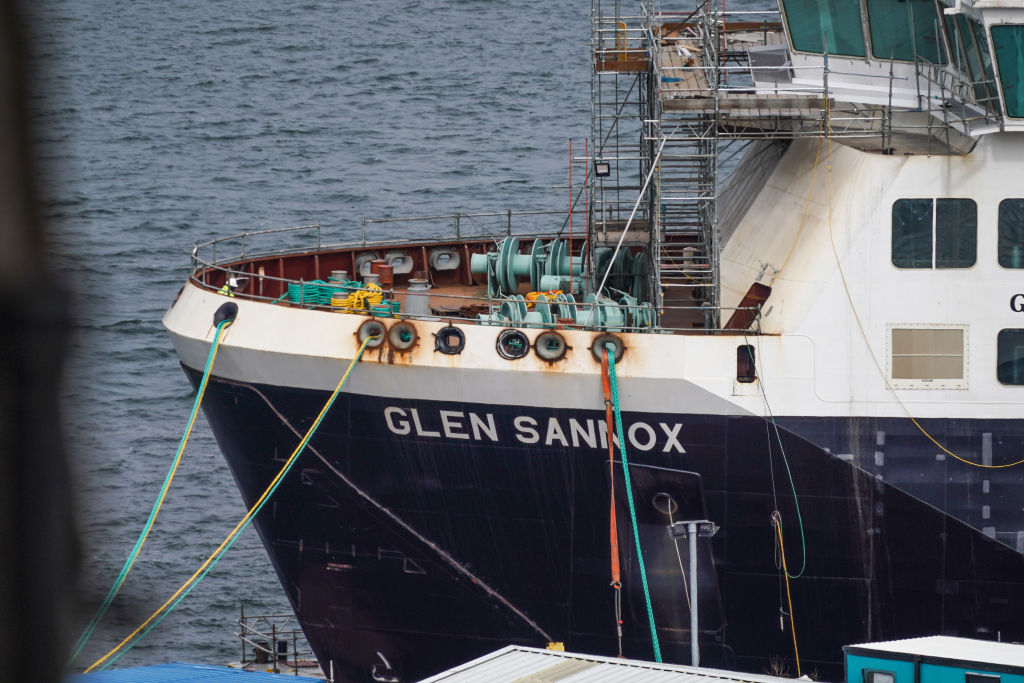Rising NHS waiting lists, a widening attainment gap in education and falling support for independence: Scotland’s next first minister will have a bulging in-tray when he or she assumes office in coming weeks. However one issue in particular seems set to be an early thorn in the side of Scotland’s new leader: the increasingly scandalous debacle of the ferries fiasco.
The latest development is today’s Scottish Government announcement of yet another delay in completing the vessels. The first of the boats, Hull 801, otherwise known as the Glen Sannox, is now expected to be ready sometime this autumn instead of May. The other boat, Hull 802, is now expected to be ready by autumn of next year instead of next March.
Humza Yousaf admitted the government’s attempts to build ferries has been ‘unacceptable’. It has been more than unacceptable. It has been shameful.
The new setback follows a report earlier this week from Audit Scotland warning that uncertainty remains over the final costs and completion dates of the two delayed ferries. The official independent body for keeping check on public money also raised concerns over the payment of performance bonuses to senior managers of the company at the heart of the scandal.
To recap, the controversy focuses on the Scottish government’s failed attempt to rescue commercial shipbuilding on the Clyde while also providing two new desperately needed ‘lifeline’ ferries for operation on Scotland’s west coast. The ferries should have been in service years ago. Instead, costs have spiralled way out of control while the construction of the vessels has gone from crisis to crisis amid allegations of a contract rigged for political purposes.
Originally costed at £97 million, it is now estimated the two vessels will have absorbed close to £300 million of public money by the time they are completed, with delivery over five years later than planned.
‘It is deeply concerning that the costs to complete these ferries have continued to escalate, whilst the island communities these boats are meant to serve remain significantly impacted,’ said Stephen Boyle, Auditor General for Scotland. ‘Despite substantial sums of public money being invested, there is still no certainty over how much the ferries will cost, when they will be ready or whether the shipyard has a viable future.’
Boyle also called out the awarding of £87,000 in performance bonus payments to senior managers at Ferguson Marine Port Glasgow (FMPG), the now publicly owned firm commissioned to build the ferries. Incredibly, Audit Scotland reports that Ferguson Marine failed to inform or seek approval from its owners, the Scottish Government, for the payments. This is something it should have done ‘as a matter of good practice and governance’, according to Audit Scotland.
‘It is unacceptable that performance bonuses were awarded to senior managers at the shipyard, without proper governance for such payments. The Scottish Government needs to make sure its rules over pay are followed by this public body,’ said Boyle.
In response, David Tydeman, chief executive of FMPG, said the company accepted the feedback regarding bonuses and promised to improve governance, adding he expects the yard will have a secure future.
That future is contingent on the company not only completing the delayed ferries but also having the contracts, workforce and systems in place to be commercially viable thereafter. Achieving those aims is costing taxpayers a fortune.
The Scottish Government increased FMPG’s 2022/23 capital funding by £27.7 million to £61.1 million, with a further £57.6 million allocated in the 2023/24 budget approved by the Scottish Parliament. Ferguson Marine estimated a further £9.5 million beyond the amount previously approved would be required to finish hulls 801 and 802.
Whoever becomes the next first minister will not relish having to deal with the ongoing fallout from Scotland’s great ferries scandal. At a leadership debate earlier this week, candidate for first minister Humza Yousaf at least admitted the Sturgeon government’s attempts to build ferries has been ‘unacceptable’. It has been more than unacceptable. It has been shameful, and a change of leader should not stymie the need for transparency on how such a flawed procurement process came about in the first place.
Here is the kicker though. Yousaf seems most likely to win the contest. Who, with knowledge of his capability as a minister, could have any confidence in his ability to finally deliver for Scotland’s island communities? And don’t forget that Yousaf was minister for transport and the islands in the early years of this scandal unfolding.
Scotland’s beleaguered islanders might have to endure ageing, unreliable ferries for a while yet.







Comments